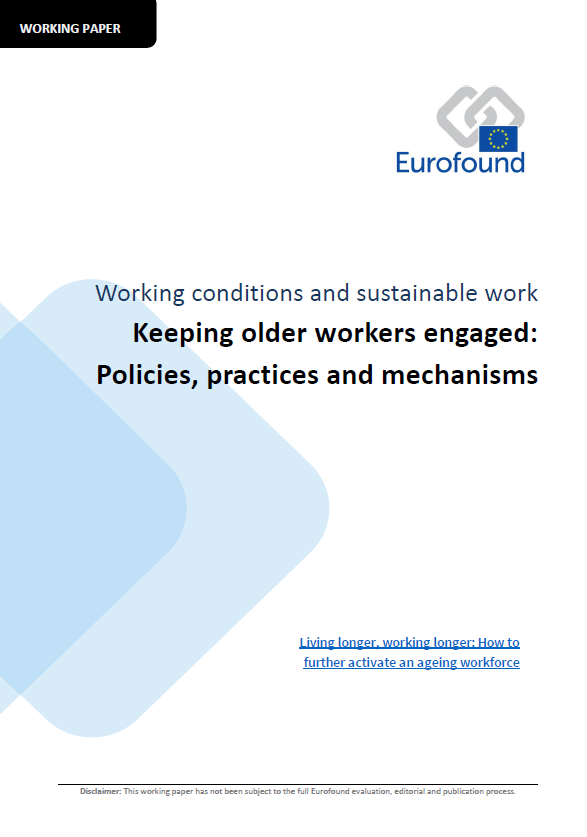EU context
Siitä huolimatta, että ikääntyvien työllisyysluvut ovat kasvaneet huomattavasti viime vuosikymmen aikana monissa EU:n jäsenvaltioissa, Euroopan komission vuoden 2017 yhteisessä työllisyysraportissa korostetaan mahdollisuutta nostaa näitä lukuja lisää. Vuonna 2016 työllisyysluku oli EU:ssa ikääntyneiden (55–64-vuotiaat) osalta 55,3 prosenttia ja kokonaisuudessaan (15–64-vuotiaat) 66,6 prosenttia. Kasvu on ollut suurinta naisten osalta.
Euroopan sosiaalisten oikeuksien pilari tarjoaa kehyksen, joka auttaa työmarkkinoita mukautumaan uusiin haasteisiin, ja edistää oikeudenmukaisuutta ja solidaarisuutta sukupolvien välillä. Se korostaa oikeutta työympäristöön, joka on mukautettu työntekijöiden ammatillisiin tarpeisiin, jotta työntekijät voivat pysyä pidempään osana työvoimaa. Lisäksi Euroopan työmarkkinaosapuolten itsenäisessä sopimuksessa aktiivisesta ikääntymisestä ja sukupolvien välisestä lähestymistavasta sitoudutaan helpottamaan ikääntyneiden työntekijöiden aktiivista osallistumista työelämään ja pysymistä siinä pidempään.
Eurofoundin toiminta
Eurofoundilla on pitkäaikainen kokemus työvoiman ikääntymiseen liittyvien kysymysten käsittelystä. 1990-luvulta lähtien tutkimuksessa on keskitytty ikääntyneiden työvoimaosuuteen, työkykyyn, työoloihin ja työskentelymieltymyksiin Euroopan muuttuvaa väestörakennetta koskevan politiikan yhteydessä. Toiminnassa on keskitytty myös julkiseen tukeen ja yritystason aloitteisiin, joilla edistetään ikääntyvien työllisyyttä. Tutkimuksessa on tarkasteltu ikääntyviä naistyöntekijöitä ja korostettu tämän ryhmän kasvavia työllisyyslukuja ja kasvavaa osuutta työvoimasta, erityisesti 55–64-vuotiaiden osalta.
Tutkimustiedot
Eurofoundin keskeiset tutkimukset tarjoavat tietoa ikääntyvien työntekijöiden tilanteesta. Kuudennessa Euroopan työolotutkimuksessa (EWCS) tarkastellaan, miten ikääntyneet työntekijät vertailevat työnlaadun eri ulottuvuuksia. Vaikka nuoret jäävät työttömiksi todennäköisemmin kuin ikääntyvät työntekijät, tutkimustiedot osoittavat ikääntyneiden työntekijöiden ajattelevan, että jäädessään työttömiksi he eivät löytäisi samapalkkaista uutta työtä ja että heillä olisi jopa vaikeuksia päästä takaisin työmarkkinoille.
Eurofoundin viidenteen Euroopan työolotutkimukseen (EWCS) perustuvassa tutkimuksessa tarkastellaan ikääntyvän työvoiman ja eri-ikäisenä työskentelyn ominaispiirteitä sekä seikkoja, jotka tekevät työstä kestävää ikääntyvän työvoiman kannalta: hyvät työolot, fyysinen ja henkinen hyvinvointi sekä työ- ja yksityiselämän tasapaino.
Eurofoundin Euroopan elämänlaatututkimus (EQLS) tarjoaa ikään liittyviä havaintoja elämänlaadun eri ulottuvuuksista Euroopassa. Kolmannen Euroopan elämänlaatututkimuksen tietojen perusteella tehty analyysi yli 50-vuotiaiden työskentelymieltymyksistä osoittaa, että monet ikääntyneet työntekijät haluavat tehdä vähemmän työtunteja, myös heidän taloudelliset tarpeet huomioiden. Helpottamalla työtuntien mukauttamista mieltymyksiin voidaan mahdollistaa ihmisten pysyminen työelämässä pidempään ja motivoida siihen.
Työelämässä pidempään pysyminen
Äskettäin Eurofound tarkasteli yhdessä kolmen muun EU:n viraston kanssa ikämyönteistä työtä Euroopassa ja poliittisia haasteita, jotka liittyvät ikääntyvään työvoimaan ja innovatiivisiin ratkaisuihin.
Monet työntekijät eivät kykene tai heillä ei ole motivaatiota pysyä työelämässä valtiolliseen eläkeikään saakka. On kuitenkin olemassa myös ryhmä, joka kykenee ja haluaa työskennellä vielä eläkeiässä. Eurofound on tutkinut tätä kasvavaa ilmiötä eli työskentelyä vielä eläkkeelle siirtymisen jälkeen.
Viimeaikaisessa tutkimuksessa on keskitytty työelämän pidentämiseen joustavien eläkejärjestelmien kautta ja tarkasteltu erityisesti osa-aikaeläkejärjestelmiä, jotka voivat helpottaa työelämän pidentämistä. Myös uran väliarvioinnit voivat edistää työelämässä pidempään pysymistä. Tutkimuksessa on tarkasteltu sitä, miten ne voivat auttaa selventämään työntekijöiden mahdollisuuksia pysyä työelämässä myöhempään eläkeikään asti. Siinä korostetaan eri välineitä, joita yritykset ovat kehittäneet säilyttääkseen ikääntyvät työntekijänsä.
Muissa tutkimuksissa on tarkasteltu hallitusten ja työmarkkinaosapuolten kansallisia ja alueellisia aloitteita ikääntyneiden työntekijöiden säilyttämiseksi työmarkkinoilla, mukaan luettuna taloudelliset kannustimet ja olojen parantaminen. Aikaisemmassa hankkeessa analysoitiin ennen taantumaa ja sen jälkeen käyttöönotettuja ikääntymisen hallintaa koskevia aloitteita Euroopan yritysten hyvien käytäntöjen korostamiseksi.
Tietolähteitä
























